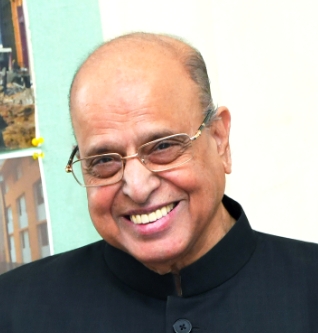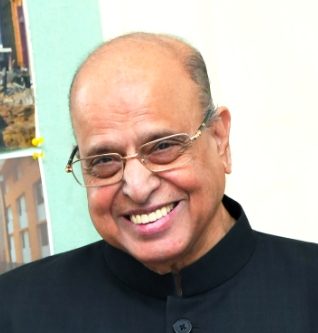
Dr Krishnaswamy Kasturirangan
- Founding Professor

Dr. Krishnaswamy Kasturirangan (born 20 October, 1940, in Ernakulam, Kerala, India) is a space scientist who headed the Indian Space Research Organization (ISRO) for more than 9 years until 2003. He was former Member of Upper House (Rajya Sabha) of Indian Parliament from 2003 to 2009. He was Director of the National Institute of Advanced Studies (NIAS) at Bangalore between 2004-2009. He is a recipient of the three civilian awards from the Government of India, the Padma Shri (1982), Padma Bhushan (1992) and Padma Vibhushan (2000).
Dr. Kasturirangan was responsible for directing the Indian Space programme for over 9 years, as Chairman of ISRO and the Space Commission and as Secretary to the Government of India in the Department of Space, before laying down office on 27 August 2003. He was earlier the Director of ISRO Satellite Centre, overseeing the development of new generation spacecraft, the Indian National Satellite (INSAT-2) and the Indian Remote Sensing Satellites (IRS-1A and 1B) as well as scientific satellites. He was also the Project Director for India’s first two experimental earth observation satellites, Bhaskara-I and II.
Under his leadership, the programme witnessed several major milestones including the successful launching and operationalisation of the India’s prestigious launch vehicles, the Polar Satellite Launch Vehicle and the Geosynchronous Satellite Launch Vehicle. Studies on the advanced version of the GSLV, GSLVMk-III, was also completed including defining its full configuration. Further, he also oversaw the development and launching of some of the world’s best civilian remote sensing satellites, IRS-1C and 1D, realization of new generation INSAT communication satellites, besides ocean observation satellites IRS-P3/P4. He also lead the initiative for India to enter the planetary exploration era by an extensive studies leading to the definition of Chandrayaan-I. These efforts have put India as a pre-eminent space-faring nation among the handful of six countries that have major space programmes. As an Astrophysicist, Dr. Kasturirangan’s interest include research in high energy X-ray and gamma ray astronomy as well as optical astronomy. Defining India’s most ambitious space based High Energy Astronomy observatory and initiating a related activities was also an important milestone under his leadership. He has made extensive and significant contributions to studies of Cosmic x-ray and gamma ray sources and effect of cosmic x-rays in the lower atmosphere.
Dr. Kasturirangan graduated in Science with Honours, and obtained his Master of Science degree in Physics, from Bombay University. He received his Doctorate Degree in Experimental High Energy Astronomy in 1971, working at the Physical Research Laboratory, Ahmedabad.
As an Astrophysicist, Dr.Kasturirangan’s research interests include high energy X-ray and gamma ray astronomy as well as optical astronomy. He has published more than 244 papers, in international and national journals, in the areas of astronomy, space science and space applications.
Dr. Kasturirangan is a member of several important scientific academies and educational institutions, both within India and abroad.
Banaras Hindu University (1994), Andhra University (1995), S.V.University, Tirupati (1996), Sri Krishna Devaraya University, Ananthpur (1998), Anna University, Chennai (1998), Roorkee University, Roorkee (1999), IIT, Bombay (2000), Chatrapati Shahu Ji Maharaj University, Kanpur (2000), Gurunanak Dev University, Amritsar (2001), University of Calcutta, Calcutta (2002), Indira Gandhi National Open University (IGNOU), New Delhi (2003), Punjab University, Chandigarh (2003), Visvesvaraya Technological University, Belgaum (2004), Alagappa University, Karaikudi (2006), Mysore University, Mysore (2007); SRM University, Chennai (2008).
Dr. Kasturirangan was responsible for directing the Indian Space programme for over 9 years, as Chairman of ISRO and the Space Commission and as Secretary to the Government of India in the Department of Space, before laying down office on 27 August 2003. He was earlier the Director of ISRO Satellite Centre, overseeing the development of new generation spacecraft, the Indian National Satellite (INSAT-2) and the Indian Remote Sensing Satellites (IRS-1A and 1B) as well as scientific satellites. He was also the Project Director for India’s first two experimental earth observation satellites, Bhaskara-I and II.
Under his leadership, the programme witnessed several major milestones including the successful launching and operationalisation of the India’s prestigious launch vehicles, the Polar Satellite Launch Vehicle and the Geosynchronous Satellite Launch Vehicle. Studies on the advanced version of the GSLV, GSLVMk-III, was also completed including defining its full configuration. Further, he also oversaw the development and launching of some of the world’s best civilian remote sensing satellites, IRS-1C and 1D, realization of new generation INSAT communication satellites, besides ocean observation satellites IRS-P3/P4. He also lead the initiative for India to enter the planetary exploration era by an extensive studies leading to the definition of Chandrayaan-I. These efforts have put India as a pre-eminent space-faring nation among the handful of six countries that have major space programmes. As an Astrophysicist, Dr. Kasturirangan’s interest include research in high energy X-ray and gamma ray astronomy as well as optical astronomy. Defining India’s most ambitious space based High Energy Astronomy observatory and initiating a related activities was also an important milestone under his leadership. He has made extensive and significant contributions to studies of Cosmic x-ray and gamma ray sources and effect of cosmic x-rays in the lower atmosphere.
Dr. Kasturirangan graduated in Science with Honours, and obtained his Master of Science degree in Physics, from Bombay University. He received his Doctorate Degree in Experimental High Energy Astronomy in 1971, working at the Physical Research Laboratory, Ahmedabad.
As an Astrophysicist, Dr.Kasturirangan’s research interests include high energy X-ray and gamma ray astronomy as well as optical astronomy. He has published more than 244 papers, in international and national journals, in the areas of astronomy, space science and space applications.
Dr. Kasturirangan is a member of several important scientific academies and educational institutions, both within India and abroad.
Banaras Hindu University (1994), Andhra University (1995), S.V.University, Tirupati (1996), Sri Krishna Devaraya University, Ananthpur (1998), Anna University, Chennai (1998), Roorkee University, Roorkee (1999), IIT, Bombay (2000), Chatrapati Shahu Ji Maharaj University, Kanpur (2000), Gurunanak Dev University, Amritsar (2001), University of Calcutta, Calcutta (2002), Indira Gandhi National Open University (IGNOU), New Delhi (2003), Punjab University, Chandigarh (2003), Visvesvaraya Technological University, Belgaum (2004), Alagappa University, Karaikudi (2006), Mysore University, Mysore (2007); SRM University, Chennai (2008).


